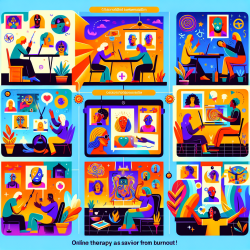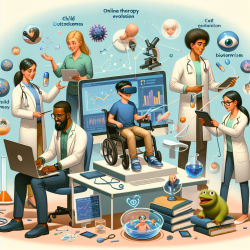In the ever-evolving landscape of special education and therapeutic interventions, TinyEYE stands at the forefront, providing online therapy services that transform lives. A recent research article, "Family Reflections on a Lifecourse Journey after Neonatal Intensive Care: Neurodiversity, Enablement and Hope," offers profound insights that can enhance the skills of practitioners and inspire further research. This blog explores key lessons from the study and their practical applications in the field of online therapy.
Understanding the Lifecourse Journey
The study by Msall and Lugli emphasizes the importance of viewing developmental disabilities through a lifecourse perspective. It highlights the need for a holistic approach that considers the individual's entire life trajectory, rather than focusing solely on immediate medical or developmental concerns. This perspective is crucial for practitioners who aim to provide comprehensive support to children and their families.
Key Lessons for Practitioners
- Lesson 1: Communicate with Care - The initial communication of diagnoses and prognoses can have a lasting impact on families. Practitioners must approach these conversations with sensitivity, honesty, and a focus on hope and enablement.
- Lesson 2: Embrace Uncertainty - Acknowledge the limitations of current evidence and the inherent uncertainties in prognostication. Encourage families to remain hopeful and to focus on potential developmental milestones.
- Lesson 3: Establish Longitudinal Registries - Implementing multicenter registries that track physical, developmental, behavioral, and social health outcomes over time can provide valuable data to inform practice and policy.
- Lesson 4: Celebrate Achievements - Recognize and celebrate developmental accomplishments, no matter how small. This positive reinforcement can significantly boost the morale of both the child and their family.
- Lesson 5: Promote Inclusive Education - Early intervention and inclusive educational settings are vital for promoting learning and social integration. Practitioners should advocate for and facilitate access to these services.
- Lesson 6: Encourage Physical Activity - Physical activities not only enhance fitness but also provide opportunities for social participation and community integration.
- Lesson 7: Plan for Adulthood - Support families in developing a comprehensive plan for the child's transition to adulthood, focusing on independence, vocational skills, and community involvement.
- Lesson 8: Integrate Physical and Behavioral Health - Ensure that physical and behavioral health needs are addressed in a coordinated manner throughout the individual's life.
- Lesson 9: Advocate for Community Supports - Advocate for accessible and comprehensive community support systems that enable individuals with developmental disabilities to lead fulfilling lives.
Encouraging Further Research
The study underscores the importance of ongoing research to better understand the complexities of neurodiversity and developmental disabilities. Practitioners are encouraged to engage in and contribute to research efforts that explore innovative therapeutic approaches, effective communication strategies, and the long-term outcomes of early interventions.
Conclusion
By implementing the insights from "Family Reflections on a Lifecourse Journey after Neonatal Intensive Care: Neurodiversity, Enablement and Hope," practitioners can enhance their skills and provide more effective support to children and families. Embracing a holistic, compassionate, and evidence-informed approach will not only improve therapeutic outcomes but also foster a sense of hope and empowerment among those we serve.
To read the original research paper, please follow this link: Family Reflections on a Lifecourse Journey after Neonatal Intensive Care: Neurodiversity, Enablement and Hope










